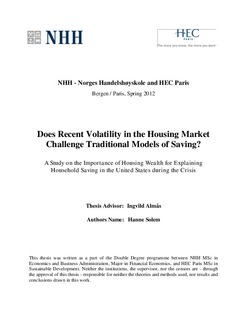Does recent rolatility in the housing market challenge traditional models of saving? : a study on the importance of housing wealth for explaining household saving in the United States during the crisis
Master thesis
Permanent lenke
http://hdl.handle.net/11250/169543Utgivelsesdato
2012Metadata
Vis full innførselSamlinger
- Master Thesis [4372]
Sammendrag
The purpose of this thesis is to study the importance of housing wealth for explaining household saving in the United States during the recent crisis. We present two fundamentally different models of saving – the Keynesian model of saving and the LCH model of saving, to investigate whether household saving over the recent crisis follows the path of Keynes or Modigliani. The empirical analysis examines consumption behavior with respect to the evolution of housing wealth to determine potential housing wealth effects associated with the dramatic fall in house prices. We perform empirical measurements of isolated time periods of housing wealth expansion as well as housing wealth declines to identify potential asymmetric wealth effects. The empirical estimates find no evidence of housing wealth effects for the time series and time periods of this study (1975-2010, 1975-2006, 1997-2006 and 2007-2010).
The thesis concludes that household saving during the recent crisis cannot be explained by housing wealth effects, and suggests that the saving behavior to a greater extent seems to follow the traditional path of Keynes rather than the LCH model of saving by Modigliani. The findings reveal no support for any presence of asymmetries in the impact of housing wealth on consumption and saving in the United States.
